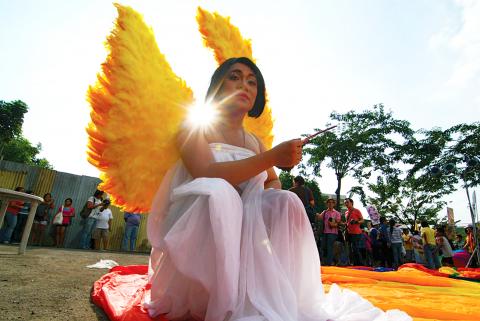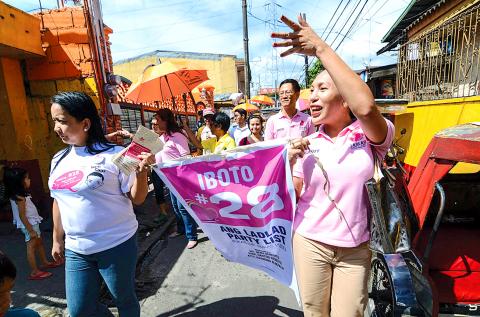There’s a scene in Out Run where a street vendor screams to campaigners in Tagalog: “Don’t have a sex change! Don’t cut it off!”
The documentary, directed by San Francisco-based filmmakers Leo Chiang (江松長) and Johnny Symons, follows the journey of Bemz Benedito, the leader of Ladlad, an LGBT political party in the Philippines, in her campaign to be the first transgender woman elected to Congress.
Chiang, who is in town for the Taiwan International Queer Film Festival where the film made its Taiwan debut last weekend, says that Out Run was inspired by reading a news article about Sunil Babu Pant, the first openly gay member of the Constituent Assembly of Nepal.

Photo courtesy of Taiwan International Queer Film Festival
“Instead of advocating for marriage equality from a human rights angle, he pitched it as an economic innovation that will lure same sex couples to Nepal for wedding tourism,” Chiang, who is openly gay, tells the Taipei Times.
“I thought that was totally genius, and started to wonder about other openly LGBT politicians outside of North America and Europe.”
He and Symons set out to find politicians from around the world who were the first in their countries to run for high-ranking office as openly LGBT. They were especially interested in learning about the non-conventional campaign methods these politicians were using to overcome entrenched prejudice in their societies.

Photo courtesy of Taiwan International Queer Film Festival
Being born and raised in Taiwan, Chiang was particularly drawn to stories from Asia. He and Symons found Benedito through an acquaintance in San Francisco, and were immediately drawn to her story of mobilizing working class transgender hairdressers and beauty queens in the Philippines.
“We reached out to Bemz, she agreed, and the rest, as they say, is history.”
TELLING UNTOLD STORIES
Chiang, who is also the director of the documentary Mr Cao Goes to Washington, which deals with racial politics in the American south, says that stories from marginalized communities have always spoken to him.
“I believe that there are many amazing stories, from people who are seen as outsiders, that are not told.”
He feels compelled, responsible even, to share these stories. However, he’s also careful to not make what he calls “eat-your-vegetable films” — films that you should watch because they’re “good for you.”
Chiang adds: “I want people to watch the film because the story is well told and the film is well made.”
Chiang says that working in documentary film doesn’t come with the same commercial constraints as movies and TV shows because they are generally supported by foundations and organizations that share similar social goals.
Chiang’s audience tends to be people who are already supportive of LGBT rights. He adds that appealing to a broader audience only requires tweaking the story.
“It’s pretty straightforward,” he says.
LGBT EXPERIENCE IN ASIA
Even in Hollywood, Chiang believes that it’s become increasingly less of a struggle to “walk the line between social-change goals and commercial goals.”
Audiences are flocking to TV shows like Transparent, which portrays transgender people as the complex, multilayered characters that they are.
The challenge now is getting people from the West interested in, or simply more aware of, films about the LGBT experience in Asia.
“Even folks savvy about LGBT history and activism tend to be fairly ignorant of LGBT communities outside of North America and Europe,” Chiang says.
There’s a generalization of places outside of the West being discriminatory against and tough for LGBT people, he says. But as his experiences in Taiwan, Thailand and the Philippines have taught him, this isn’t always the case.
Considering the annual pride parade scheduled to take place this Saturday, Chiang says that although he’s not an expert, Taipei seems to be one of the most queer-friendly cities in Asia, especially for young people who seem to be able to live without serious discrimination.
He adds, however, that if Taiwan wants to get noticed outside of Asia for its progressiveness towards LGBT rights, more should be done. Passing marriage equality law or electing an openly queer person to prominent public office, for instance, would certainly help.
Festival notes
What: Taiwan International Queer Film Festival (台灣國際酷兒影展)
When: Until Sunday
Where: Taipei Shin Kong Cinemas (台北新光影城), 4F, 36, Xining S Rd, Taipei City (台北市西寧南路36號4樓)
Admission: Regular ticket is NT$200 per film or NT$510 for three films. Tickets are available through FamilyMart FamiPort kiosk or at www.famiticket.com.tw
On the net: www.tiqff.com

Oct. 21 to Oct. 27 Sanbanqiao Cemetery (三板橋) was once reserved for prominent Japanese residents of Taipei, including former governor-general Motojiro Akashi, who died in Japan in 1919 but requested to be buried in Taiwan. Akashi may have reconsidered his decision if he had known that by the 1980s, his grave had been overrun by the city’s largest illegal settlement, which contained more than 1,000 households and a bustling market with around 170 stalls. Fans of Taiwan New Cinema would recognize the slum, as it was featured in several of director Wan Jen’s (萬仁) films about Taipei’s disadvantaged, including The Sandwich

“Wish You Luck is not just a culinary experience, it’s a continuation of our cultural tradition,” says James Vuong (王豪豐), owner of the Daan District (大安) Hong Kong diner. On every corner of Kowloon, diners pack shoulder-to-shoulder over strong brews of Hong-Kong-style milk tea, chowing down on French Toast and Cantonese noodles. Hong Kong’s ubiquitous diner-style teahouses, known as chachaanteng (茶餐廳), have been a cultural staple of the city since the 1950s. “They play an essential role in the daily lives of Hongkongers,” says Vuong. Wish You Luck (祝您行運) offers that same vibrant melting pot of culture and cuisine. In

Much noise has been made lately on X (Twitter), where posters both famed and not have contended that Taiwan is stupid for eliminating nuclear power, which, the comments imply, is necessary to provide the nation with power in the event of a blockade. This widely circulated claim, typically made by nuclear power proponents, is rank nonsense. In 2021, Ian Easton, an expert on Taiwan’s defenses and the plans of the People’s Liberation Army (PLA) to break them, discussed the targeting of nuclear power plants in wartime (“Ian Easton On Taiwan: Are Taiwan’s nuclear plants safe from Beijing?”, April 12, 2021). The

Artificial intelligence could help reduce some of the most contentious culture war divisions through a mediation process, researchers say. Experts say a system that can create group statements that reflect majority and minority views is able to help people find common ground. Chris Summerfield, a co-author of the research from the University of Oxford, who worked at Google DeepMind at the time the study was conducted, said the AI tool could have multiple purposes. “What I would like to see it used for is to give political leaders ... a better sense of what people ... really think,” he said, noting surveys gave